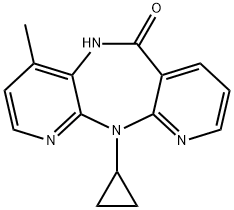The reverse transcriptase of HIV-1---Nevirapine
Apr 19,2022
Nevirapine (previously known as BI-RG-587) is a dipyridodiazepinone derivative and a potent and highly specific inhibitor of the reverse transcriptase of HIV-1. It has no activity against HIV-2 or any other retrovirus. It is a member of a class of structurally diverse non-nucleoside reverse transcriptase inhibitor (NNRTI) compounds that share part, or all, of the same binding site on the HIV reverse transcriptase enzyme. A screening program at Boehringer Ingelheim Pharmaceuticals resulted in the discovery of nevirapine. It is marketed by Boehringer Ingelheim under the trade name Viramunes and is also marketed in several generic fixed-dose formulations, in both adult and pediatric doses.
Nevirapine is available for oral administration in tablets containing 200 mg nevirapine and oral suspension containing 10 mg/ml nevirapine. The suspension is supplied in 240-ml bottles with a recommended storage temperature of 15–30 1C. There is no parenteral formulation available. Generic formulations of nevirapine and fixed-dose combinations that include nevirapine are produced, and meet US Food and Drug Administration (FDA) criteria for average bioequivalence.
Nevirapine is used in combination with other antiretroviral agents (usually two nucleoside analogs) for chronic HIV infection and is also used alone or in combination with other agents for prevention of mother-to-child transmission. Nevirapine has a long half-life and can be dosed once or twice daily. It has a low genetic barrier to development of resistance and the major toxicity is rash and hepatitis.
Drug interactions
Many drug interactions occur at the level of different cytochrome P450 isoenzymes. Nevirapine is both a substrate for and induces cytochrome P4503A4 and 2B6 enzymes, but has no significant effect on cytochrome P4501A2, 2D6, 2C9, or 2C19 enzymes. CYP3A4 is present in gastrointestinal enterocytes, as well as the primary site, the liver. In addition, modification of activity and expression of active drug transport systems by nevirapine are important in determining the pharmacokinetics of nevirapine. P-glycoprotein is not involved in nevirapine transport and nevirapine does not induce P-glycoprotein expression. Multidrug resistance-related proteins (MRP) also contribute to elimination of drugs and their metabolites as efflux transporters.
Nevirapine is a weak inhibitor of MRP1, MRP2, and MRP3, and a modest inhibitor of the breast cancer resistance protein (BCRP/ABCG2), the clinical relevance of which has not been determined in clinical studies. Many drug interactions with nevirapine are theoretical as formal drug interaction studies have not been performed for all potential interactions with drugs metabolized by cytochrome P4503A4 iso-enzymes. It is important to check drug interaction websites and the pharmacy for the latest information on interactions.
- Related articles
- Related Qustion
- Application of Nevirapine as the Non-Nucleoside Reverse Transcriptase Inhibitor Oct 15, 2019
Nevirapine is a non-Nucleoside Reverse Transcriptase Inhibitor (NNRTI) that blocks RNA-dependence and the activity of DNA-dependent DNA polymerase.
Tenofovir is an acyclic nucleoside phosphonate. Tenofovir is manufactured as the prodrug tenofovir disoproxil fumarate (TDF) and subsequently converted in vivo to its active form, tenofovir diphosphate.....
Apr 19,2022Antimicrobial agentEfavirenz, earlier known as L-743,726 and DMP-266, is a benzoxazinone compound that was developed by DuPont Merck at Merck Research Laboratories and subsequently co-marketed by DuPont Merck Pharmaceuticals.....
Apr 19,2022Antimicrobial agentNevirapine
129618-40-2You may like
- Pyriofenone: Synthesis and Application
Feb 5, 2024
- How is Picarbutrazox synthesised and what does it do?
Feb 5, 2024
- How is Tolprocarb synthesised?
Feb 4, 2024
- Nevirapine
-

- $1.00 / 1ASSAYS
- 2024-04-30
- CAS:129618-40-2
- Min. Order: 1ASSAYS
- Purity: 99
- Supply Ability: 500
- Nevirapine
-

- $0.00 / 1KG
- 2024-03-16
- CAS:129618-40-2
- Min. Order: 100g
- Purity: 98%+
- Supply Ability: 100kg
- Nevirapine
-

- $1.00 / 100G
- 2024-01-08
- CAS:129618-40-2
- Min. Order: 100G
- Purity: 99%
- Supply Ability: 50000tons




